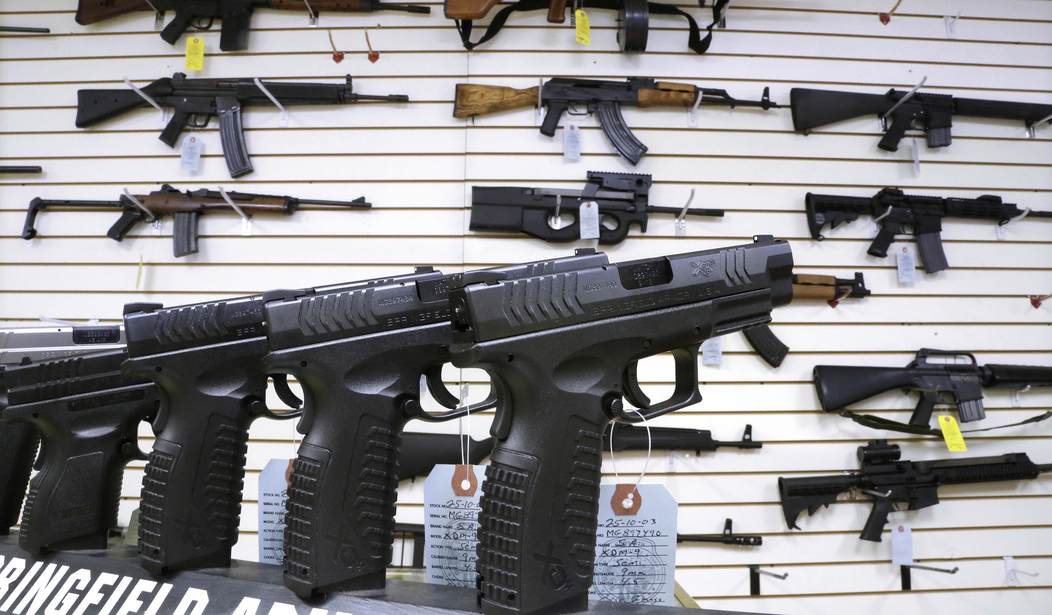America's veterans face a particularly gnarly conundrum: their path of least resistance to get healthcare, and mental health care, is via the Veterans Administration. And they should be able to get the care - they earned it right?
Well, that's the theory, anyway.
But the VA has been operating with a bit of an ulterior motive, seeing it as an opportunity to "get another gun off the street". The gun of a criminal? An incipient spree-killer?
Well, generally not. But to paraphrase Lavrentii Beria, "Show me the gun and I'll show you the crime".
Seeking VA help has become grounds to list the veteran in the National Instant Criminal Background Check System (NICS) - effectively denying veterans the right to keep and bear arms, not for any criminal convictions, but for having sought help at all.
And they're not even particularly coy about it:
📣UPDATE:
— Gun Owners of America (@GunOwners) March 11, 2025
The bureaucrat who told @HouseVetAffairs he wouldn’t restore veterans' gun rights—even if Congress passed the GOA-backed bill—is now testifying before the Senate on the Veterans 2nd Amendment Protection Act.pic.twitter.com/mSOQehPReS https://t.co/0SCG8HtKia
You heard that right - the VA will defy an act of Congress in deference to another executive branch's administrative interpretation of the Brady Bill.
(But don't you dare say there's any such thing as a "deep state"!)
Senators John Kennedy of Louisiana and Rand Paul of Kentucky want to take a shot at fixing the problem, and have introduced a bill with that in mind:
“Our veterans should not receive less due process rights than other Americans just because they served our country and asked the federal government for a helping hand,” Kennedy said in a press release. “Under the VA’s interpretation of the law, however, unelected bureaucrats punish Louisiana and America’s veterans by forcing them to choose between their Second Amendment rights and getting the help they need as they manage their financial affairs.
The proposed legislation would eliminate a VA policy that flags veterans as “mental defectives” if they require assistance with managing their benefits. This has resulted in about 260,000 veterans losing their right to keep and bear arms since 1998 without a judicial ruling. The measure is aimed at ensuring that those who served in the Armed Forces are not unjustly stripped of their Second Amendment rights due to decisions made by bureaucrats.
After 20 years of war, many veterans do need the help. And when people who are veterans and who have serious mental health problems aren't recogniized, much less helped, the results can be catastrophic:
A federal judge has ruled the U.S. Air Force is largely culpable for the Sutherland Springs
shooting in 2017. The Air Force did not submit the shooter's criminal history into an FBI
database, which would have prevented him from purchasing the weapon he used in the
attack.
Judge Xavier Rodriguez in San Antonio said the Air Force was 60% responsible for the
attack. They’re also liable for damages.
Devin Kelley, a former serviceman, killed 26 people and injured more than 20 after
opening re at the First Baptist Church in Sutherland Springs [in 2017]. He had
been discharged from the Air Force several years before the shooting for bad conduct,
after a conviction of assault against his former wife and stepson.
The Sutherland Springs case involved a veteran with known issues serious enough to lead to his discharge, though. Due process should have left him ineligible to own firearms (and would have, had the USAF done its job of reporting the disqualifying conviction).
That shouldn't affect the 2nd Amendment rights of otherwise law-abiding veterans seeking help.
And if this law passes, and the VA gets some serious reform, it won't.








